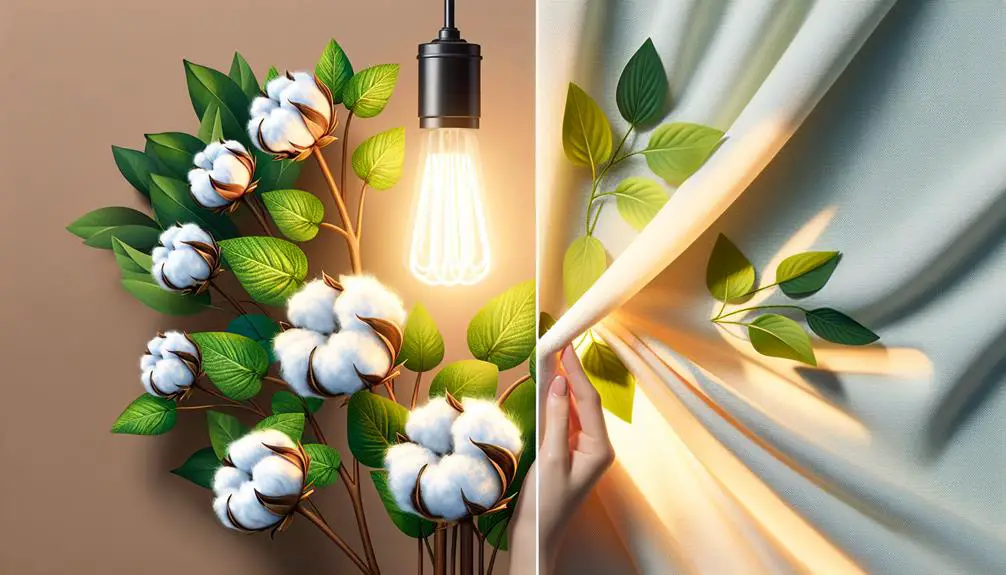From my experience, I'd say lyocell might be a better choice than cotton in many ways. Lyocell's made from renewable wood pulp and it's got an eco-friendly production process. It feels luxurious and is great at moisture-wicking, which keeps you cool and comfy. It's also super durable due to its strong fibers. Meanwhile, cotton takes a ton of water and pesticides to produce, which isn't too kind to our planet. However, lyocell is usually pricier and needs gentle care. If you're curious about how these differences could affect your choice, there's more to consider beyond just this.
Table of Contents
Key Takeaways
- Lyocell is more sustainable than cotton, using eco-friendly production and biodegradable materials.
- Lyocell offers superior breathability and moisture-wicking properties, ideal for comfort in various climates.
- Lyocell fibers are more durable and softer, providing a luxurious feel compared to cotton.
- Cotton requires extensive water and pesticide use, making Lyocell a more environmentally friendly option.
- Lyocell's closed-loop manufacturing process minimizes waste and chemical exposure, enhancing its eco-friendliness.
Understanding Lyocell Fabric
Lyocell, made from wood pulp, is a sustainable and durable fabric that's gaining popularity. It's not just any fabric; it's crafted from cellulose fibers, which are natural and renewable. That makes it super eco-friendly. The process of turning wood pulp into Lyocell is pretty neat, and it's better for our planet than a lot of other fabrics out there.
Now, let's talk about what it feels like. Lyocell has this luxurious feel, thanks to its sateen weave. It's smoother than your typical rayon but doesn't feel quite like cotton. If you're someone who gets hot when you sleep, you'll love this fabric. It's breathable and moisture-wicking, which means it helps keep you cool all night. I've tried it, and it really makes a difference, especially on warm nights.
Besides being great for hot sleepers, Lyocell is easy to care for and holds up well over time. That's a big plus if you don't want to keep replacing things. All in all, it's a solid choice if you're looking for something new to try in your bedroom.
Understanding Cotton Fabric
Let's talk about how cotton is made and its effect on the environment.
The process of growing cotton uses a lot of water and chemicals, which isn't great for our planet.
Understanding these aspects can really help us figure out if it's the best choice for our clothes and bedding.
Cotton Production Process
Understanding how cotton is produced reveals a lot about why it's so popular, despite its environmental drawbacks. The cotton production process starts with planting different types of cotton, each varying by fiber length, like the luxurious Egyptian cotton. These plants gulp down a lot of water and need heaps of pesticides, which brings up serious environmental concerns.
Here's a quick breakdown:
| Aspect | Detail | Impact |
|---|---|---|
| Water | High consumption | Resource depletion |
| Pesticides | Extensive use | Chemical pollution |
| Fiber Quality | Improves with each wash | Consumer satisfaction |
Cotton's softness that enhances with each wash makes it a cozy choice, but it's not exactly environmentally friendly. We're using tons of resources and chemicals here, folks!
Cotton Environmental Impact
The environmental toll of cotton farming is huge, needing loads of water and pesticides that harm our planet.
Here's a quick rundown on why:
- Water usage: It takes about 2,700 liters of water just to make one cotton t-shirt. That's a ton of water!
- Pesticides: Cotton uses about 16% of the world's insecticides. Not great for our health or the earth.
- Soil degradation: All those chemicals mess up the soil big time.
- Deforestation: To plant cotton, folks are clearing out massive areas. This means less home for wildlife.
Switching to organic cotton might be a step forward. It's a more sustainable alternative that cuts down on those harsh chemicals and saves our soil and water.
Benefits of Lyocell
Now, let's talk about why Lyocell might just edge out cotton.
It's not only super soft and durable, but it's also made through eco-friendly processes.
Plus, it's great at wicking away moisture, keeping you cool and comfy all night long.
Eco-Friendly Production Processes
Lyocell stands out due to its eco-friendly production processes, utilizing renewable resources and minimizing waste. Here's why it's catching the eye:
- Renewable Wood Pulp: It's made from fast-growing eucalyptus trees. This means it relies on a renewable source, which is a big plus for sustainability.
- Closed-Loop Process: The manufacturing recycles chemical solvents and minimizes pollution. It's a smarter way to produce fabric without hurting our planet.
- Less Water Usage: Compared to cotton, lyocell needs way less water. We're talking major water conservation!
- Biodegradable: After its life cycle, lyocell can biodegrade. No lingering waste in landfills!
I'm all for a fabric that's as kind to Earth as it's to our wardrobes!
Moisture Wicking Properties
Why settle for sweaty nights when lyocell sheets can keep you cool and dry? If you're like me, finding the right bedding for a restful night is a big deal.
Lyocell's got these awesome moisture-wicking properties that absorb and draw away moisture. This means it keeps my skin dry and stops that icky clammy feeling.
So, if you're a hot sleeper or live in a humid climate, lyocell sheets might just be your new best friend. They're not only comfortable but also ensure a cooler sleeping experience because they're super breathable.
Honestly, nothing beats hopping into bed feeling fresh and staying cool all night long. Trust me, it's a game-changer!
Durability and Softness
Besides keeping you cool, lyocell sheets are also incredibly durable and feel softer than traditional cotton. They're just a better choice when you're looking for that perfect balance of comfort and longevity in your bedding. Let's dive into why these sheets are a game-changer:
- Durability: Thanks to stronger fibers, lyocell withstands more wear and tear.
- Softness: The luxurious, smooth texture comes from finer fibers.
- Long-lasting: These sheets don't just last a few washes. They stick around, making them a savvy investment.
- Resistance: Lyocell's natural resistance to damage keeps your sheets looking new longer.
I'm telling you, once you try lyocell, you might never go back to plain old cotton!
Drawbacks of Lyocell
Despite its benefits, lyocell also has some drawbacks that are worth considering. Let's dive into a few issues I've noticed with lyocell sheets. They're indeed soft and have a nice sheen, but they come with a higher price point. This can be a real bummer if you're watching your budget. Plus, they're not as widely available as cotton, making it tougher to find a good deal.
Caring for lyocell can also be a bit tricky. They require gentle handling and specific wash instructions. If you're not careful, they might even shrink after the first wash, which can mess up the fit on your bed. That's not ideal, especially after you've spent more on them.
Here's a quick table breaking down these points:
| Aspect | Detail | Impact |
|---|---|---|
| Care | Needs gentle handling and washing | High maintenance |
| Price Point | Generally higher than cotton | Less accessible |
| Availability | Less common in low price ranges | Harder to find good deals |
Benefits of Cotton
While lyocell has its shortcomings, let's not forget the time-tested benefits of cotton, especially when it comes to bedding. I've always leaned towards cotton for my sheets, and here's why:
- Natural and Renewable: Cotton is a natural fiber that's also a renewable resource. This aspect makes me feel good about my environmental footprint every time I choose cotton bedding.
- Breathable and Moisture-Wicking: Nothing beats coming into a bed that feels fresh and cool. Cotton's breathability and moisture-wicking properties mean I'm not waking up feeling sweaty.
- Softness and Comfort: There's a unique comfort that comes with high-quality cotton. Its softness just gets better with each wash, enhancing the comfort level of my bed.
- Durable and Suitable for Sensitive Skin: With my sensitive skin, I've to be careful about the fabrics I use. Cotton isn't only gentle on the skin, but it's also durable. I don't have to worry about frequent replacements.
Cotton's long fibers contribute to the high-quality feel of the fabric, making it an undeniably wise choice for anyone looking for comfort and longevity in their bedding.
Drawbacks of Cotton
Cotton's environmental impact is a major concern, as it requires a lot of water and pesticides to grow. It's definitely not the most environmentally friendly option out there. We're talking serious water usage and heavy pesticide requirements, which isn't great for our planet.
Besides the eco-issues, cotton isn't always comfy for everyone. Some folks find that cotton sheets can cause skin irritation. Not fun, right? Plus, if you hate ironing, here's another snag—cotton can wrinkle easily. You often need to iron your cotton clothes if you want that smooth appearance.
And let's talk about shopping for cotton. Finding high-quality options can be a real headache. With so many overwhelming market choices, it's tough to spot the good stuff. You could spend ages looking and still not find what you really want.
Lastly, on those hot summer nights, cotton sheets mightn't be your best friend. They aren't as breathable as some alternatives, which means you could end up feeling all sweaty and uncomfortable. So, while cotton has its perks, these drawbacks really make you think twice, especially if you're after something a bit more user and earth-friendly.
Frequently Asked Questions
What Are the Disadvantages of Lyocell?
Lyocell's downsides? It's pricey, shrinks after the first wash, and needs careful handling to stay nice. You won't find it cheap, and it's a bit of a hassle to maintain.
Does Lyocell Feel Like Cotton?
I've found that lyocell does feel similar to cotton, with a silky smooth texture. It's even softer and gives off a luxurious vibe, making it great for comfy sheets that wick moisture well.
Is Lyocell a Luxury?
Yes, I'd say Lyocell is a luxury. Its silky texture and eco-friendly production make it stand out. Plus, it's durable and moisture-wicking, which are great for both comfort and sustainability.
Is Lyocell Long Lasting?
Yes, I've found that lyocell is quite long-lasting. Its strong fibers resist weakening and breaking, which means it doesn't pill or fray easily, staying soft and sturdy for years with proper care.
- Tetron Fabric for Marine Applications: Durability and Use Cases - June 18, 2025
- Tetron Fabric for Outdoor Furniture: Weather Resistance and Care - June 18, 2025
- Tetron Fabric for Wall Coverings: Style and Application Tips - June 18, 2025







